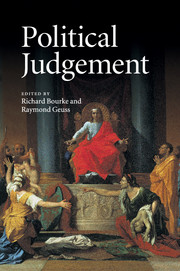Book contents
- Frontmatter
- Contents
- List of contributors
- Acknowledgements
- Introduction
- Part I The character of political judgement
- Part II Trust, judgement and consent
- Part III Rationality and judgement
- Part IV Democracy and modern political judgement
- 10 Democracy, equality and redistribution
- 11 Democracy and terrorism
- Bibliography of the works of John Dunn
- Index
10 - Democracy, equality and redistribution
from Part IV - Democracy and modern political judgement
Published online by Cambridge University Press: 26 December 2009
- Frontmatter
- Contents
- List of contributors
- Acknowledgements
- Introduction
- Part I The character of political judgement
- Part II Trust, judgement and consent
- Part III Rationality and judgement
- Part IV Democracy and modern political judgement
- 10 Democracy, equality and redistribution
- 11 Democracy and terrorism
- Bibliography of the works of John Dunn
- Index
Summary
Introduction
Democratic citizens are not equal but only anonymous, indistinguishable by any traits they may possess. Democracy only places a veil over distinctions that exist in society. Even the one sense in which equality can be said to characterise democracy – equality before the law – is derivative from anonymity: the law has to treat all citizens equally because they are indistinguishable.
This norm of anonymity was circumvented in most early representative systems by an elaborate intellectual construction that justified restrictions of suffrage. The argument held that the role of representatives is to promote the good of all, yet the intellectual capacity to recognise the common good and the moral qualities necessary to pursue it are not universal. These traits can be recognised by using some indicators, such as wealth, age and gender. Hence, relying on such indicators to restrict suffrage does not violate democratic norms. The logic of the argument is unimpeachable, but it is easy to suspect that it rationalised interests. This is the way it was perceived by those excluded, poor males and women, as they fought for political rights.
Yet even if political rights are universal, to ignore distinctions is not to obliterate them. Democracy was a political revolution, but not an economic one. Should we be surprised that democracy turned out to be compatible with economic inequality? From its inception, representative institutions were haunted by the spectre of the poor using their political rights to redistribute property. Should we be surprised that democracy did not undermine property, that the democratic revolution was never completed by being extended to the economic realm? These three themes are developed below.
- Type
- Chapter
- Information
- Political JudgementEssays for John Dunn, pp. 281 - 312Publisher: Cambridge University PressPrint publication year: 2009
- 4
- Cited by



